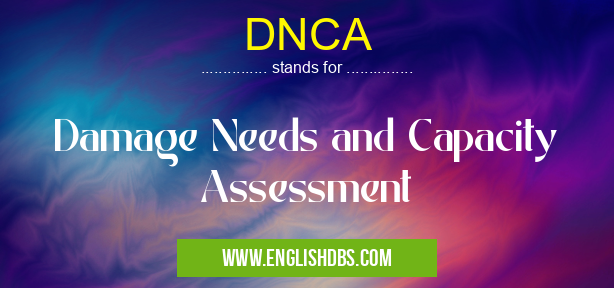What does DNCA mean in UNCLASSIFIED
DNCA stands for Damage Needs and Capacity Assessment. It is a set of assessment tools used to evaluate a community's assets, needs, and ability to respond after experiencing a natural disaster. DNCA allows professionals to create an accurate picture of the extent of the damage and determine how much assistance is needed from outside agencies. This information can then be used to create a plan for recovery that is tailored to the specific needs of the community in question.

DNCA meaning in Unclassified in Miscellaneous
DNCA mostly used in an acronym Unclassified in Category Miscellaneous that means Damage Needs and Capacity Assessment
Shorthand: DNCA,
Full Form: Damage Needs and Capacity Assessment
For more information of "Damage Needs and Capacity Assessment", see the section below.
Essential Questions and Answers on Damage Needs and Capacity Assessment in "MISCELLANEOUS»UNFILED"
What is DNCA?
DNCA stands for Damage Needs and Capacity Assessment. It is a set of assessment tools used to evaluate a community's assets, needs, and ability to respond after experiencing a natural disaster.
Who uses DNCA?
Professionals such as government officials, emergency responders, aid workers, and others use DNCA when responding to natural disasters or other large-scale emergencies.
How does DNCA work?
DNCA allows professionals to assess the extent of damage caused by a disaster or emergency, identify what resources are available or needed within the affected community, and develop an appropriate response plan based on that information. The goal is to provide targeted assistance that meets the unique needs of each community.
What kind of data does DNCA analyze?
Data analyzed with DNCA includes population information, infrastructure damage assessments, medical requirements, resource availability (including food and water), potential environmental impacts, communication systems evaluation etc.
Why is it important to use DNCA?
Using DNCA provides useful information about where resources are needed most in order for communities affected by disasters or emergencies receive efficient assistance during their recovery process. It also facilitates active engagement from all stakeholders involved in the response effort by helping them better understand what they need in order to effectively respond to the situation at hand.
Final Words:
In short, Damage Needs and Capacity Assessment (DNC) offers communities a way to accurately measure their losses following major disasters or emergencies so that they can better plan their recovery efforts with targeted assistance from outside organizations. By understanding both their capacity and damages suffered as well as determining what resources are needed most within their own local area, these assessments allow communities largely affected by these events acquire necessary aid quickly while they navigate through difficult times.
DNCA also stands for: |
|
| All stands for DNCA |
